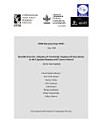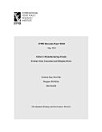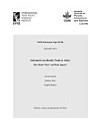Do agricultural projects help smallholders transition to better livelihood strategies?
Hazell, Peter · Timu, Anne G. · Savastano, Sara · Massotti, Piero
IFPRI Discussion Paper Kitabu cha 1 · Intl Food Policy Res Inst
Kitabu pepe
29
Kurasa
family_home
Kimetimiza masharti
info
reportUkadiriaji na maoni hayajahakikishwa Pata Maelezo Zaidi
Kuhusu kitabu pepe hiki
Agricultural projects typically aim to promote the uptake of project components amongst targeted farm populations to improve their on-farm productivity within a “theory of change” that leads to improvements in their welfare. While this approach can be an important first step towards improving smallholder livelihoods, it ignores alternative and often superior livelihood options that might arise within the rural transformation process. These options can be particularly important for agricultural value chain projects that generate new market opportunities and secondary off-farm income and employment growth within the rural nonfarm economy. We argue that the design of smallholder projects implemented within regions already undergoing a dynamic transformation and/or on projects which have significant value chain components, should be broadened to assist smallholders make successful transitions to their best livelihood options. For such projects, M&E should also track livelihood transitions as well as the usual assessments of progress made, the achievement of expected goals, and the identification of bottlenecks in implementation. To help operationalize such an approach, we propose a typology of smallholder livelihood strategies that can track transitions over time and illustrate its use with an IFAD funded agricultural value chain project in Malawi. Using econometric methods and available household panel data, we find that the project helped some smallholders transition out of subsistence farming to market farming with a corresponding increase in their per capita incomes. The project also helped some households transition to, or remain with, an off-farm income diversification strategy with favorable per capita income outcomes. This may reflect new opportunities that arose as spillover benefits from the project along local agricultural value chains and within the rural nonfarm economy more broadly. We conclude with some lessons for the design, monitoring and evaluation of future agricultural projects.
Kadiria kitabu pepe hiki
Tupe maoni yako.
Kusoma maelezo
Simu mahiri na kompyuta vibao
Sakinisha programu ya Vitabu vya Google Play kwa ajili ya Android na iPad au iPhone. Itasawazishwa kiotomatiki kwenye akaunti yako na kukuruhusu usome vitabu mtandaoni au nje ya mtandao popote ulipo.
Kompyuta za kupakata na kompyuta
Unaweza kusikiliza vitabu vilivyonunuliwa kwenye Google Play wakati unatumia kivinjari cha kompyuta yako.
Visomaji pepe na vifaa vingine
Ili usome kwenye vifaa vya wino pepe kama vile visomaji vya vitabu pepe vya Kobo, utahitaji kupakua faili kisha ulihamishie kwenye kifaa chako. Fuatilia maagizo ya kina ya Kituo cha Usaidizi ili uhamishe faili kwenye visomaji vya vitabu pepe vinavyotumika.






